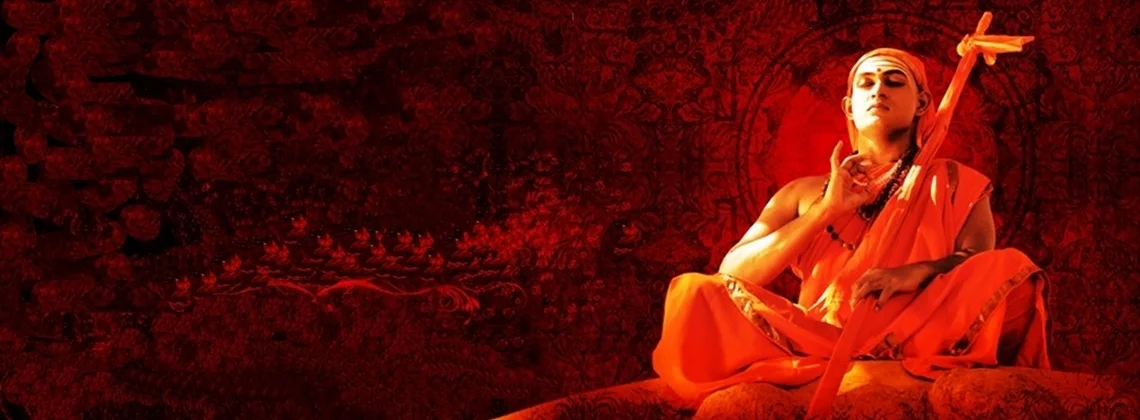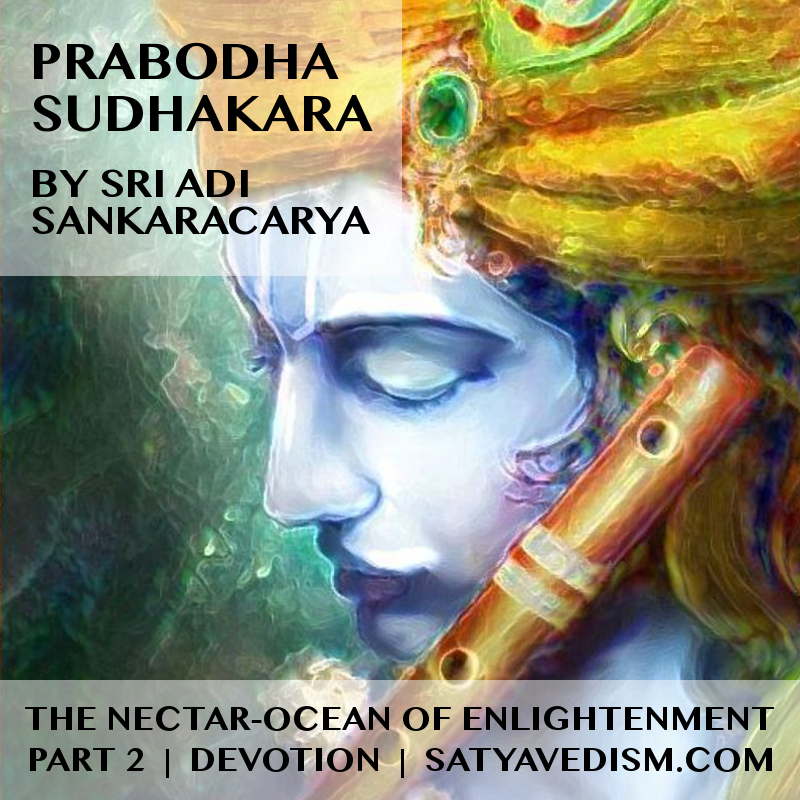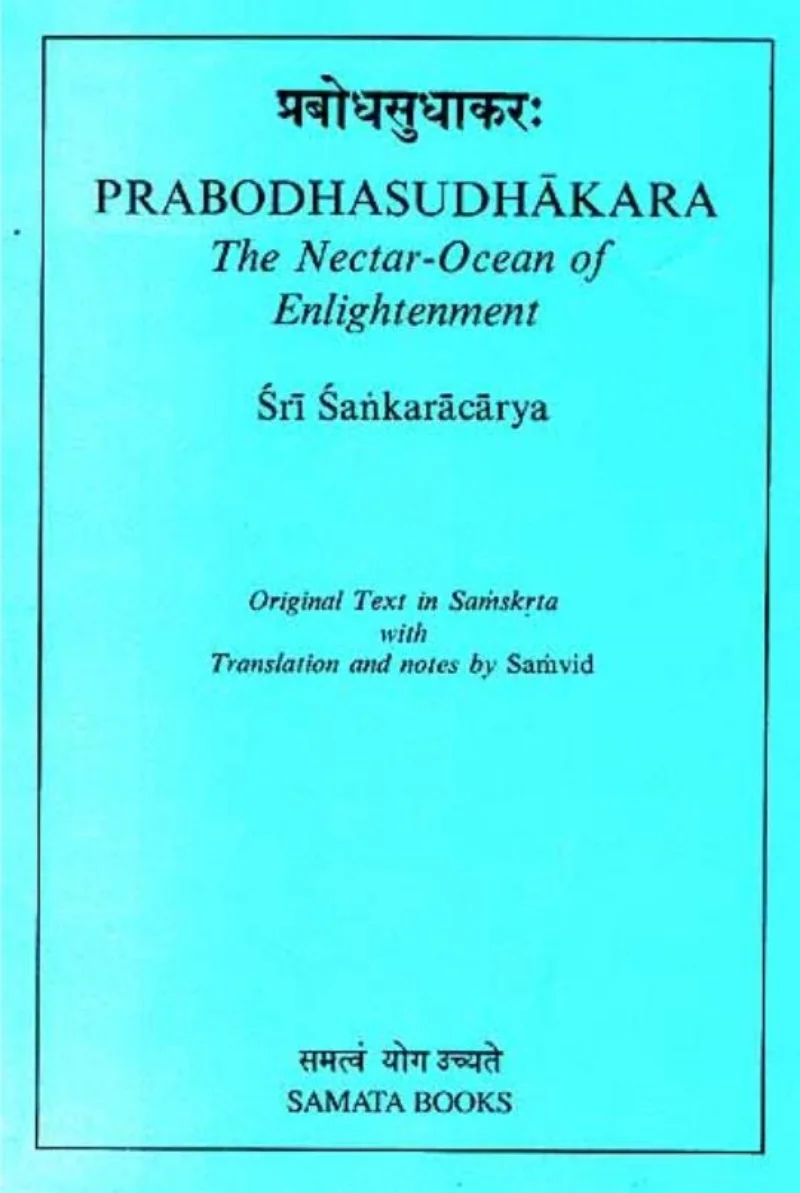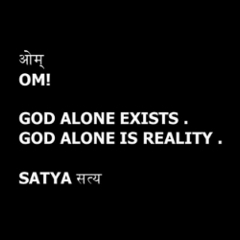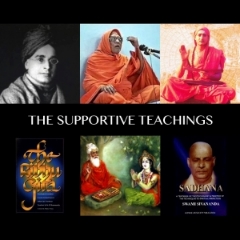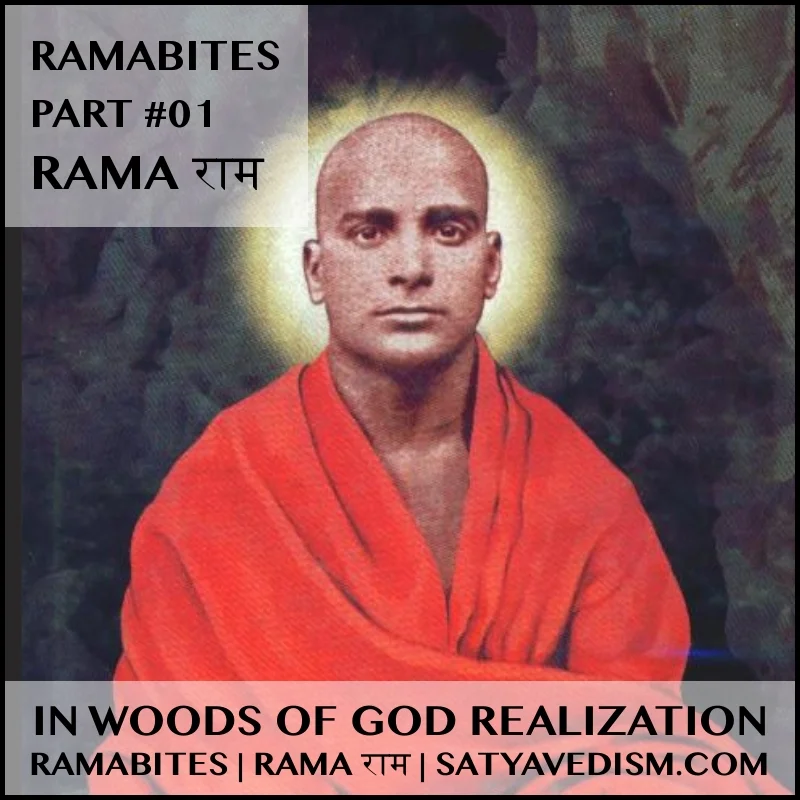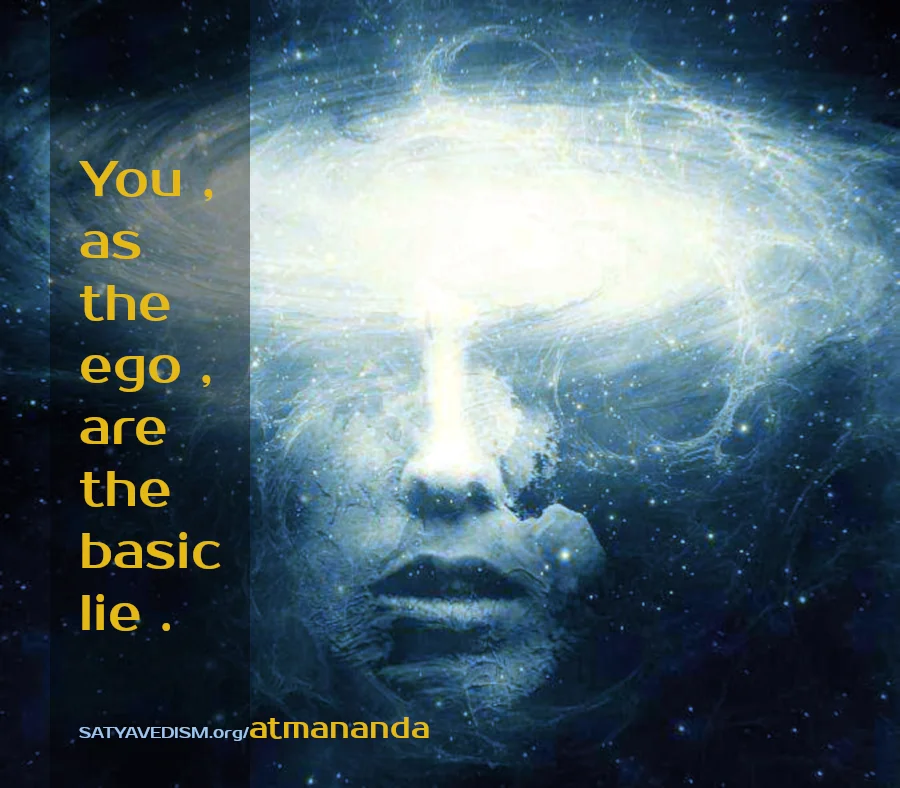PRABODHASUDHAKARA | PART 2 | DEVOTION
| | homePRABODHASUDHAKARA | THE NECTAR OCEAN OF ENLIGHTENMENT | PART 2 | DEVOTION | SRI ADI SANKARACARYA | TRANSLATION & BHASYA BY SAMVID | PSNOE SERIES | SATYAVEDISM.ORG
|| PRABODHASUDHAKARA | DEVOTION | UNABRIDGED ||
CH 16 | INTRODUCTION TO PART 2 | DEVOTION
CH 16 | SECTION ON DEVOTION IN TWO WAYS
CH 17 | SECTION ON MANNER OF MEDITATION
CH 18 | SECTION ON ONENESS OF GOD W+WO ATTRIBUTES
CH 19 | SECTION ON DIVINE GRACE
PRABODHASUDHAKARA | DEVOTION | ADI SANKARACARYA
|| INTRO | PART 2 | DEVOTION | SAMVID & AUROBINDO ||
THE DEVOTIONAL FERVOUR WHICH THE AUTHOR EXHIBITS IN THE FOUR CONCLUDING SECTIONS OF THIS WORK would appear to be in sharp contrast with the author's relentless pursuit of Truth through rational enquiry , found in the earlier sections .
Are the stories of the Purana-s historical or mythical ?
How can one reconcile the exaggerated and mostly unbelievable exploits of gods , rulers and those found in the Purana-s , with rational enquiry into Truth ?
These are the questions that trouble the seeker after Truth who studies the traditional scriptures of the Hindus .
The Purana-s are a combination of history , myth and spiritual symbol .
To the faithful , following the path of devotion , they are history .
To the sceptic , they are just myth .
To the seeker after Truth , they are both history and spiritual symbol interwoven with myth to elucidate spiritual principles .
The following extract on the historicity of KRSNA from Essays on the Gita by Sri Aurobindo , a great Yogin who lived in recent times , is relevant in this context .
The this illuminating extract from Sri Aurobindo's writings forms a fitting introduction to what follows in the rest of this work :
|| INTRO | KRSNA | ESSAYS ON THE GITA | AUROBINDO ||
. . . for the fundamental teaching of the Gita . . . or for spiritual life generally . . . the KRSNA who matters to us is the eternal incarnation of the Divine and not the historical teacher and leader of people . . . . The historical KRSNA , no doubt , existed .
We meet the name first in the Chandogya Upanisad where all we can gather is that KRSNA was well-known in spiritual tradition as a knower of BRAHMAN , so well-known indeed the personality and the circumstances of the life that it was sufficient to refer by the name of the parent as , KRSNA offspring of Devaki , for all to understand who was meant .
In the same Upanisad we find mention of ruler Dhrtarastra , offspring of Vicitravirya , and since tradition associated the two together so closely that they are both of them leading personages in the action of the Mahabharata , we may fairly conclude that they were actually contemporaries and that the epic is to a great extent dealing with historical characters and in the war of Kurukesetra , with a historical occurrence imprinted firmly on the memory of the race .
We know too that KRSNA and Arjuna were the object of religious worship in the pre-Christian centuries ; and there is some reason to suppose that they were so in connection with a religious and philosophical tradition from which the Gita may have gathered many of its elements and even the foundation of its synthesis of knowledge , devotion and works , and perhaps also that the human KRSNA was the founder , restorer or at least one of the early teachers of this school .
The Gita may well , in spite of its later form , represent the outcome in Indian thought of the teaching of KRSNA and the connection of that teaching with the historical KRSNA with Arjuna and with the war of Kuruksetta may be something more than a dramatic fiction .
In the Mahabharata , KRSNA is represented both as the historical character and the Avatar ; KRSNA's worship and Avatarhood must therefore have been well established by the time — apparently from the fifth to the first centuries BC — when the old story and poem or epic tradition of the Bharatas took its present form .
There is a hint also in the poem of the story or legend of the Avatar's early life in Vrndavana which , as developed by the Purana-s into an intense and powerful spiritual symbol , has exercised so profound an influence on the religious mind of India .
We have also in the Harivamsa an account of the life of KRSNA , very evidently full of legends which perhaps formed the basis of the Puranic accounts .
But all this , though of considerable historical importance , has none whatever for our present purpose .
We are concerned only with the figure of the Divine Teacher as it is presented to us in the Gita and with the Power for which it there stands in the spiritual illumination of the human being .
The Gita accepts the human Avatarhood ; for the Lord speaks of the repeated , the constant manifestation of the Divine in humanity , when the Eternal Unborn assumes by Maya , by the power of the infinite Consciousness to clothe itself apparently in finite forms , the conditions of becoming which we call birth .
But it is not this upon which stress is laid , but on the transcendent , the cosmic and the internal Divine ; it is on the Source of all things and the Master of all and on the GODhead secret in humans .
It is this internal divinity who is meant when the Gita speaks of the doer of violent Asuric austerities troubling the GOD within or of the sin of those who despise the Divine lodged in the human body or of the same GODhead destroying our ignorance by the blazing lamp of knowledge .
It is then the eternal Avatar , this GOD in human , the divine Consciousness always present in the human being who , manifested in a visible form , speaks to the human soul in the Gita , illumines the meaning of life and the secret of divine action and gives it the light of the divine knowledge and guidance and the assuring and fortifying word of the Master of existence in the hour when it comes face to face with the painful mystery of the world .
This is what the Indian religious consciousness seeks to make near to itself in whatever form , whether in the symbolic human image it enshrines in its temples or in the worship of its Avatar-s or in the devotion to the human Guru through whom the voice of the one world-Teacher makes itself heard .
Through these , it strives to awaken to that inner voice , unveil that form of the Formless and stand face to face with that manifest divine Power , Love and Knowledge .
PRABODHASUDHAKARA | DEVOTION | ADI SANKARACARYA
|| CHAPTER 16 | THE SECTION ON DEVOTION IN TWO WAYS ||
|| 16 | DEVOTION IN TWO WAYS | 166 ||
When there is the birth of Sattva ( or goodness and harmony ) in the mind , there is the dawn of Pure Awareness like lightning .
Only if the mind attains to purity , can that ( Pure Awareness ) become firm .
PRABODHASUDHAKARA | DEVOTION | ADI SANKARACARYA
|| 16 | DEVOTION IN TWO WAYS | 167 ||
The inner self ( or the mind which is the inner instrument of perception ) , surely does not become pure without devotion to the lotus-feet of Lord KRSNA .
The mind is cleansed by devotion as a garment by caustic ( or detergent ) water .
PRABODHASUDHAKARA | DEVOTION | ADI SANKARACARYA
|| 16 | DEVOTION IN TWO WAYS | 168 ||
As the face is reflected very well in a dirty mirror when it is purified for a longtime by ash and the like , so is the knowledge ( of the SELF ) in the pure mind .
|| BHASYA | SAMVID ||
The mind is covered by impurities in the form of desires .
When they are removed , it reflects the light of the SELF .
PRABODHASUDHAKARA | DEVOTION | ADI SANKARACARYA
|| 16 | DEVOTION IN TWO WAYS | 169-70 ||
Those who may be knowers ( of the SELF ) through devotion to HARI can understand the cause for that .
The Upanisad ( says ) thus :
" There are just two forms of the Supreme SPIRIT ( or Ultimate Reality ) , the embodied and also the non-embodied . "
The devotees of those two are also ( of ) two ( kinds as ) taught by the Divine Lord ( in the Bhagavadgita ) .
Between these two , liberation can occur with difficulty or without difficulty .
|| BHASYA | SAMVID ||
The reference here is to the Brhadaranyakopanisad .
The Supreme SPIRIT has two forms , one with attributes and the other without attributes .
Sri KRSNA mentions in the Gita that those who strive for GOD-Realization by the worship of or meditation on the unmanifest and attributeless Reality will find it more difficult to reach their goal than those who worship the Divine form with all auspicious attributes .
PRABODHASUDHAKARA | DEVOTION | ADI SANKARACARYA
|| 16 | DEVOTION IN TWO WAYS | 171 ||
Devotion to HARI is referred to in two ways thus : the gross and the subtle .
In the beginning , it may be gross and from its presence , the subtle ( devotion may arise ) .
PRABODHASUDHAKARA | DEVOTION | ADI SANKARACARYA
|| 16 | DEVOTION IN TWO WAYS | 172-5 ||
( The characteristics of gross devotion are ) :
The performance of the duties relating to one's stage in life ( ie , student , house holder , forest-dweller or renunciant ) , celebration of the worship of the image of KRSNA every day by doing various kinds of ( ritual ) services , association with the devotees of HARI always , great inclination in hearing the stories of KRSNA , speaking the truth , turning the back upon ( or avoiding ) the young spouse of another , the wealth ( of another ) or reviling others , distress on ( hearing ) vulgar talk , devotion to going on pilgrimage to holy places and anxiety that life has gone in vain in the absence of talk on the Lord of the Yadu-race .
While being engaged in devotion in this manner , there arises the subtle devotion born of the Grace of the stories of KRSNA , in which HARI enters within ( the heart of the devotee ) .
|| BHASYA | SAMVID || READ INTRODUCTION ABOVE
PRABODHASUDHAKARA | DEVOTION | ADI SANKARACARYA
|| 16 | DEVOTION IN TWO WAYS | 176 ||
( The characteristics of subtle devotion are ) :
The practice of mental worship on the form of HARI ( KRSNA ) as learnt from the words of the Smrti-s and the proper Purana-s and the intention to reside in a solitary place —
|| BHASYA | SAMVID ||
Smrti-s are codes of law or conduct in social and religious life compiled by sages on the basis of the Veda-s , adapted to particular times in the history of the Hindu society .
Purana-s , as pointed out earlier , are partly historical and partly mythical .
They also expound spiritual truths through allegorical stories .
PRABODHASUDHAKARA | DEVOTION | ADI SANKARACARYA
|| 16 | DEVOTION IN TWO WAYS | 177 ||
The true knowledge of the abidance of KRSNA in all living beings , absence of malice towards the multitude of created beings and then there would be compassion for all creatures —
PRABODHASUDHAKARA | DEVOTION | ADI SANKARACARYA
|| 16 | DEVOTION IN TWO WAYS | 178 ||
Contentment on the accidental acquisition of ( even ) a little , the absence of the feeling of " mine " in spouse , offspring and the like , absence of egotism , freedom from anger —
PRABODHASUDHAKARA | DEVOTION | ADI SANKARACARYA
|| 16 | DEVOTION IN TWO WAYS | 179 ||
Soft-speaking nature , clearness of mind , equanimity in censure or praise of oneself , ability to bear the pairs of opposites ( such as ) pleasure and pain , heat and cold , absence of fear from misfortune —
PRABODHASUDHAKARA | DEVOTION | ADI SANKARACARYA
|| 16 | DEVOTION IN TWO WAYS | 180 ||
Indifference towards sleep , food and play , being without the company of people , absence of occasion for speech , everlasting peace by the remembrance of KRSNA —
PRABODHASUDHAKARA | DEVOTION | ADI SANKARACARYA
|| 16 | DEVOTION IN TWO WAYS | 181 ||
The manifestation of bliss on the songs concerning HARI being sung by someone or in the sound of the flute ; simultaneously , there may be an abundance of external indications of emotion such as ( the hair on the body ) bristling with joy .
PRABODHASUDHAKARA | DEVOTION | ADI SANKARACARYA
|| 16 | DEVOTION IN TWO WAYS | 182 ||
The mind being held in that ( state of bliss born out of the intense feeling of love ) experiences the supreme delight of the SELF .
When that ( state of the mind ) becomes firm , it is reduced to the condition of an intoxicated elephant .
|| BHASYA | SAMVID ||
Verses 181 and 182 describe the acme of subtle devotion .
It leads to Mahabhava Samadhi or total absorption of the mind through the intense feeling of love .
On the dissolution of the mind , what remains is the Pure Consciousness-Bliss .
The analogy of the intoxicated elephant suggests the difference between the absorption of the mind through subtle devotion and that through spiritual practices like concentration and meditation .
In the former , there is a very great expansion of the limited mental consciousness through GOD LOVE until it vanishes into the infinite awareness of the SELF .
In the latter , there is a progressive reduction of the field of mental consciousness to a point which is the object contemplated upon .
This ultimately leads to the transcendence of the mind and its absorption in Pure Consciousness .
PRABODHASUDHAKARA | DEVOTION | ADI SANKARACARYA
|| 16 | DEVOTION IN TWO WAYS | 183 ||
( The devotee ) perceives gradually , the nature of the Divine Lord in ( all ) living beings ( and ) all beings in the Divine Lord .
If such a condition ( or understanding ) exists , only then one is the best among the servants ( or devotees ) of HARI .
PRABODHASUDHAKARA | DEVOTION | ADI SANKARACARYA
|| CHAPTER 17 | THE SECTION ON THE MANNER OF MEDITATION ||
|| 17 | MANNER OF MEDITATION | 184-8 ||
Keep in mind HARI , blue as the cloud , illuminating the world here by HARI's Lustre , wearing yellow garments , entire body anointed with sandal and camphor , eyes drawn up to the ears , ears adorned with a pair of earrings , lotus-like face ( blooming ) with a gentle smile , wearing a necklace of jewels beautiful with the excellent Kaustubha gem , lighting up the beautiful ornaments such as bracelets and finger-rings ( with HARI's Effulgence ) , wearing a garland of wood-flowers moving to and fro on the neck , the ( sinful ) dark age of Kali driven away by HARI's Lustre , having black bees making a humming sound on the head endowed with a bunch of flowers , staying inside a bower and eating together with cowherds , sitting on the ground placing ( one ) foot over ( the other ) foot , under a Kalpa tree in the very beautiful forest of Vrndavana situated near the bank of Yamuna river .
|| BHASYA | SAMVID ||
In these beautiful verses , the charm of KRSNA is described in words , the elegance of which cannot , perhaps , be caught fully in the translation .
PRABODHASUDHAKARA | DEVOTION | ADI SANKARACARYA
|| 17 | MANNER OF MEDITATION | 189 ||
Bow to the Supreme Person ( KRSNA ) , the giver of great bliss , ( who is of the nature of ) the highest Bliss , who is served by the gentle breeze-made fragrant by Mandara and whose feet are attended by the celestial river Ganga .
PRABODHASUDHAKARA | DEVOTION | ADI SANKARACARYA
|| 17 | MANNER OF MEDITATION | 190 ||
Bow to ( KRSNA ) the descendant of Yadu , who has made surrounding region fragrant , who is surrounded on all sides by hundreds of cows , who is intent on destroying fear of the gods and who is agreeable to the cows .
|| BHASYA | SAMVID ||
The above verses contain allusions to the life of KRSNA in Gokula and Vrndavana where the childhood was spent .
Even the cows of Gokula were attracted by the charming child and the sweet strains of music from the flute .
PRABODHASUDHAKARA | DEVOTION | ADI SANKARACARYA
|| 17 | MANNER OF MEDITATION | 191 ||
Having left KRSNA , who is possessed of the beauty of ten million cupids , who is the giver of desired fruits and who is an ocean of compassion , what other object do the pair of eyes attempt to see ?
PRABODHASUDHAKARA | DEVOTION | ADI SANKARACARYA
|| 17 | MANNER OF MEDITATION | 192 ||
Having abandoned the story of HARI which is most sacred , extremely tasty and pleasing to the mind , how does the pair of ears exhibit eagerness to hear vulgar speech ?
PRABODHASUDHAKARA | DEVOTION | ADI SANKARACARYA
|| 17 | MANNER OF MEDITATION | 193 ||
It is indeed the misfortune of the senses that they cling to other objects which are momentary and which even bring about sin , when there is KRSNA , the eternal object ( or refuge ) .
PRABODHASUDHAKARA | DEVOTION | ADI SANKARACARYA
|| CHAPTER 18 | THE SECTION ON ONENESS OF ( GOD CONSIDERED AS ) POSSESSED OF ATTRIBUTES OR DEVOID OF ATTRIBUTES ||
|| 18 | ONENESS OF GOD W+WO ATTRIBUTES | 194 ||
I shall describe very clearly that identity of GOD ( or Ultimate Reality ) with attributes and beyond attributes which is told in a concealed manner by the Veda-s and the great Purana-s .
PRABODHASUDHAKARA | DEVOTION | ADI SANKARACARYA
|| 18 | ONENESS OF GOD W+WO ATTRIBUTES | 195 ||
This ornament of the Yadu-race , ( KRSNA ) , is only that Supreme SELF who is higher than Nature ( consisting of the three Guna-s or energies ) , who is the inner controller within all beings , who is full of Knowledge and is Pure Existence-Consciousness-Bliss .
PRABODHASUDHAKARA | DEVOTION | ADI SANKARACARYA
|| 18 | ONENESS OF GOD W+WO ATTRIBUTES | 196 ||
( OBJECTION ) : Does not one with attributes indeed have a visible body and also an abode in one place ?
How can one , endowed with passion and anger like an ordinary person , be the Supreme SELF ?
PRABODHASUDHAKARA | DEVOTION | ADI SANKARACARYA
|| 18 | ONENESS OF GOD W+WO ATTRIBUTES | 197 ||
( REPLY ) : All other visible objects are perceived by this eye .
The Divine Lord is not perceived by this faculty of seeing .
( The Lord ) accessible to the eye of knowledge .
PRABODHASUDHAKARA | DEVOTION | ADI SANKARACARYA
|| 18 | ONENESS OF GOD W+WO ATTRIBUTES | 198 ||
Since the Divine Lord gave Partha ( or Arjuna ) the divine eye at the time of showing the universal form , invisiblity is proper in HARI become human ( ie , KRSNA , the incarnation of the Divine Lord Visnu ) .
|| BHASYA | SAMVID ||
The reference is to the assumption by Sri KRSNA of the universal form encompassing all that exists during the discourse on the battlefield of Kuruksetra for the enlightenment of Arjuna .
Before assuming that form , KRSNA blessed Arjuna with the divine eye so that Arjuna could perceive what is invisible to the human eye .
PRABODHASUDHAKARA | DEVOTION | ADI SANKARACARYA
|| 18 | ONENESS OF GOD W+WO ATTRIBUTES | 199-200 ||
As the disc of the sun is actually seen as a circle in one place ( and ) that illuminates the whole world ( and ) is seen simultaneously by all everywhere , so , this Lord of the Yadu-race ( KRSNA ) , though appearing with form and occupying one place , is all-pervading , the SELF of all , and Pure Being-Conciousness-Bliss .
|| BHASYA | SAMVID ||
The Divine Lord is omnipresent , immanent in all beings and is of the nature of mere Being , Pure Awareness and Absolute Bliss .
PRABODHASUDHAKARA | DEVOTION | ADI SANKARACARYA
|| 18 | ONENESS OF GOD W+WO ATTRIBUTES | 201 ||
The One Divine Lord sported with several cowherds simultaneously ; or HARI ( remained ) at the same time ( in the residences ) of Janaka , ( the ruler ) of Videha and Smtadeva , the Brahmana .
|| BHASYA | SAMVID ||
This and many other verses in the remaining portions of this work contain references to the incidents in Sri KRSNA's life as portrayed in the Bhagavata and other Purana-s .
They illustrate the symbolic significance of the narratives contained in the Purana-s , without detracting from their value as the holy life-history of this incarnation of GOD .
PRABODHASUDHAKARA | DEVOTION | ADI SANKARACARYA
|| 18 | ONENESS OF GOD W+WO ATTRIBUTES | 202 ||
Or , Duryodhana saw the army bearing the form of KRSNA .
Therefore , KRSNA , the Divine Lord HARI , the Supreme Ruler , is the ( all )-pervading SELF .
PRABODHASUDHAKARA | DEVOTION | ADI SANKARACARYA
|| 18 | ONENESS OF GOD W+WO ATTRIBUTES | 203 ||
When Srivatsa struck ( HARI ) on the chest , did Srivatsa become an enemy of the Lord of Laksmi ?
The fruit ( accruing ) to devotees , demons and others is alike .
|| BHASYA | SAMVID ||
The Supreme SELF is the Eternal Witness and is beyond causation .
PRABODHASUDHAKARA | DEVOTION | ADI SANKARACARYA
|| 18 | ONENESS OF GOD W+WO ATTRIBUTES | 204 ||
Therefore , anybody is neither an enemy , nor a friend , nor even a stranger ( to the Divine Lord ) .
HARI become human , the Lord of the Yadu-race , is like a tree bearing fruit standing on a good road .
|| BHASYA | SAMVID ||
Such a tree gives its shade and fruits to all the travelers without differentiation .
So is the Lord .
Whoever seeks The Lord , obtains the Lord's gifts .
Sanmarga ( a good road ) also means a virtuous way of life .
PRABODHASUDHAKARA | DEVOTION | ADI SANKARACARYA
|| 18 | ONENESS OF GOD W+WO ATTRIBUTES | 205 ||
Even when the touchstone is being broken by multitudes of iron rods , the iron is reduced to the state of gold ; so is the attainment ( of GOD ) by enemies , even on account of hate .
|| BHASYA | SAMVID ||
The mythical touchstone is said to convert all metals , coming into contact with it , into gold .
Even if an iron rod is used to break it , it will turn into gold .
Similarly , even the enemies of GOD , attained union with GOD through the fixation of their minds on GOD , on account of enmity .
PRABODHASUDHAKARA | DEVOTION | ADI SANKARACARYA
|| 18 | ONENESS OF GOD W+WO ATTRIBUTES | 206 ||
( OBJECTION ) : Is not this succession of living beings indeed born from the presence of the SELF ?
And , the SELF is dearer than the world .
That does not at all happen in the subject in hand .
|| BHASYA | SAMVID ||
The objector holds that all living beings were not born of KRSNA and KRSNA is neither the supreme object of love for everybody .
PRABODHASUDHAKARA | DEVOTION | ADI SANKARACARYA
|| 18 | ONENESS OF GOD W+WO ATTRIBUTES | 207 ||
( REPLY ) : On the occasion of the removing of the calves ( by Brahma , the Creator-God ) , HARI , to cause the delusion of Brahma , brought into existence from HARI , cowherds along with calves having different ages , appearances , inclinations and ornaments .
PRABODHASUDHAKARA | DEVOTION | ADI SANKARACARYA
|| 18 | ONENESS OF GOD W+WO ATTRIBUTES | 208 ||
KRSNA ( the Supreme SELF ) produced a multitude of living beings from KRSNA's own body to demonstrate the import of the Sruti ( or the Upanisad ) ( reading ) as follows :
" As tiny sparks issue forth from fire — "
|| BHASYA | SAMVID ||
The Mundaka Upanisad says :
" As sparks having the same nature are produced by thousands from well-kindled fire , so are born manifold beings from the Imperishable ( Reality ) " .
PRABODHASUDHAKARA | DEVOTION | ADI SANKARACARYA
|| 18 | ONENESS OF GOD W+WO ATTRIBUTES | 209-12 ||
And , at one time , when KRSNA was conducting the calves ( to graze ) in a place overgrown with foliage on the bank of the Yamuna river and , in like manner , when the respectable ( elder ) cowherds were conducting the cows for grazing in excellent grazing fields at a distance , the cows , having seen ( each its own ) calf from afar , set out running towards them , flurried by affection and difficult to be checked by the cowherds .
With their udders flowing often with excess of milk ( and ) having reached the calves as before , they fed ( them with milk ) with extreme joy , licking ( them ) with ( their ) large tongue , though possessing ( other ) calves ( born after them ) .
The cowherds also caught hold of their children , kissing their foreheads .
Thus , there grew for a moment , an unearthly enjoyment for them in that place .
PRABODHASUDHAKARA | DEVOTION | ADI SANKARACARYA
|| 18 | ONENESS OF GOD W+WO ATTRIBUTES | 213 ||
The cowherds and the calves who were different formerly , indeed became of the nature of KRSNA ( at that time ) .
By that ( incident ) , the dearness of the SELF was shown by KRSNA in these ( objects ) .
|| BHASYA | SAMVID ||
In lieu of the cowherds and the calves removed and hidden by Brahma , KRSNA had brought forth from KRSNA , identical calves and cowherds who , consequently , partook of the very nature of KRSNA .
This explains the extreme love for them which was generated in their parents .
The SELF , verily , is the most beloved of every person .
PRABODHASUDHAKARA | DEVOTION | ADI SANKARACARYA
|| 18 | ONENESS OF GOD W+WO ATTRIBUTES | 214 ||
" That which is dearer than the child , dearer than wealth and more intimate ( or dearer ) than all other things , is the SELF . "
Thus is declared the Truth of the Upanisad .
|| BHASYA | SAMVID ||
The quotation is from the Brhadaranyaka Upanisad .
The above incident in the life of KRSNA illustrates this truth .
PRABODHASUDHAKARA | DEVOTION | ADI SANKARACARYA
|| 18 | ONENESS OF GOD W+WO ATTRIBUTES | 215 ||
( OBJECTION ) : Does not the SELF indeed exist quite equally in beings , high and low ?
Then , how possibly , did that KRSNA fall into the feeling of difference in Arjuna and Duryodhana ?
|| BHASYA | SAMVID ||
KRSNA actually did not join either of the warring families , Pandava-s and Kaurava-s , in the Mahabharata war .
KRSNA only acted as the charioteer of Arjuna and did not fight .
But KRSNA espoused the cause of Arjuna in earlier negotiations , since it was a just cause .
PRABODHASUDHAKARA | DEVOTION | ADI SANKARACARYA
|| 18 | ONENESS OF GOD W+WO ATTRIBUTES | 216 ||
( REPLY ) : The deaf , the blind , the lame , the dumb , the tall , the short and the beautiful ; all such cowherds with the calves were seen by that Brahma as ( Visnu ) having four arms .
|| BHASYA | SAMVID ||
If any person had observed a difference in the conduct of KRSNA towards different people , it was only apparent .
KRSNA was ever equal to everybody .
The Divine Law or Universal Order is fulfilled through the medium of diverse instruments like Arjuna or Duryodhana , the Lord being the impartial witness .
This is confirmed by the vision of Brahma who saw all the cowherds and calves in the form of Visnu whose incarnation KRSNA was .
PRABODHASUDHAKARA | DEVOTION | ADI SANKARACARYA
|| 18 | ONENESS OF GOD W+WO ATTRIBUTES | 217 ||
The equality of HARI , become human , in all beings is directly declared by the Upanisad thus :
" It is indeed identical ( in essence ) with the mosquito and the elephant and also identical with the three worlds . "
|| BHASYA | SAMVID ||
The quotation is from the Brhadaranyaka Upanisad ( I.iii.22 ) .
The formless and all-pervasive SPIRIT exists equally in all beings .
PRABODHASUDHAKARA | DEVOTION | ADI SANKARACARYA
|| 18 | ONENESS OF GOD W+WO ATTRIBUTES | 218 ||
( OBJECTION ) : As for the SELF , is it not indeed a nonenjoyer ?
If Vasudeva ( KRSNA ) is just so , how is there sporting with the spouses of others , through various deceitful endeavours ?
PRABODHASUDHAKARA | DEVOTION | ADI SANKARACARYA
|| 18 | ONENESS OF GOD W+WO ATTRIBUTES | 219 ||
( REPLY ) : Some cowherds , having seen KRSNA who was lovely and had a very fresh ( or youthful ) appearance , were infatuated .
Longing for KRSNA with their heart , they suffered the agony of separation on account of love .
PRABODHASUDHAKARA | DEVOTION | ADI SANKARACARYA
|| 18 | ONENESS OF GOD W+WO ATTRIBUTES | 220 ||
Moving , standing , eating and wholly engaged in the duties of the house , they did not at all experience ( any ) other object except KRSNA , though before the eyes .
PRABODHASUDHAKARA | DEVOTION | ADI SANKARACARYA
|| 18 | ONENESS OF GOD W+WO ATTRIBUTES | 221 ||
On account of the delusion caused by the unbearable feeling of love in separation , they saw their own spouses , trees , people and animals thus :
" THIS IS HARI " .
And , being much delighted , they embraced them hurriedly .
PRABODHASUDHAKARA | DEVOTION | ADI SANKARACARYA
|| 18 | ONENESS OF GOD W+WO ATTRIBUTES | 222 ||
" A certain cowherd , acting like KRSNA drank from the breast of someone acting as Putana " ; thus says Vyasa who is Narayana incarnate .
|| BHASYA | SAMVID ||
This incident is narrated by the great Vyasa , who is considered to be an incarnation of Lord Narayana , in the famous Bhagavata .
The love-intoxicated cowherds not only saw KRSNA everywhere but behaved as if they were KRSNA , enacting the wonderful incidents in KRSNA's life .
PRABODHASUDHAKARA | DEVOTION | ADI SANKARACARYA
|| 18 | ONENESS OF GOD W+WO ATTRIBUTES | 223 ||
Therefore , inhabitants of Vraja , beholding their own respective spouses in the form of KRSNA ( embraced them ) .
It is HARI who is actually the internal controller of themselves , others and the spouses of rulers .
|| BHASYA | SAMVID ||
The author presents an interpretation of the much misunderstood account of the love of the cowherds for KRSNA .
PRABODHASUDHAKARA | DEVOTION | ADI SANKARACARYA
|| 18 | ONENESS OF GOD W+WO ATTRIBUTES | 224-5 ||
On reflection from ( the point of view of ) the highest Truth , the human body , though perishable , attains to the state of identity with the Supreme SELF , ( as deduced ) from the example of jaggery and its sweetness .
How much more would it apply to the sportive body of HARI , become human , who is the Divine Lord having infinite powers , performing unearthly ( or unusual ) actions here ( in this world ) through Maya ( or Divine illusive Power ) ?
|| BHASYA | SAMVID ||
As jaggery and its sweetness cannot be separated , so the body of the Supreme SPIRIT is identical with it .
Certainly , the body of KRSNA assumed by the Divine Lord Visnu sportively out of infinite powers , is not different from the Transcendent Reality .
KRSNA's unearthly deeds were part of this Divine Play and had a Divine Purpose .
PRABODHASUDHAKARA | DEVOTION | ADI SANKARACARYA
|| 18 | ONENESS OF GOD W+WO ATTRIBUTES | 226 ||
KRSNA showed the entire universe in the mouth , to the parent who was angry due to KRSNA's eating clay ( and subsequently had ) the parent's mouth fully opened ( by surprise ) .
Then , what more ( is needed to prove that ) KRSNA is of the form of the whole universe ?
|| BHASYA | SAMVID ||
Here is another incident which happened during the childhood of KRSNA .
When questioned by the parent on having eaten clay while playing , KRSNA opened the mouth wide to disprove it .
KRSNA's parent was wonder-struck when seeing the whole universe with all its beings within KRSNA's mouth .
The Supreme SPIRIT is all-pervasive .
All this is indeed the Supreme SPIRIT .
PRABODHASUDHAKARA | DEVOTION | ADI SANKARACARYA
|| CHAPTER 19 | THE SECTION ON DIVINE GRACE ||
|| 19 | DIVINE GRACE | 227 ||
( The demon ) Putana arrived at the house ( of KRSNA ) to make KRSNA drink ( milk ) from a pair of breasts , dangerous with poison .
The body of that greatly fortunate one became an offering to KRSNA .
|| BHASYA | SAMVID ||
This and the following verses describe the events in KRSNA's life when unbounded Grace liberated even persons who tried to kill , or who hated , KRSNA , or were underserving of KRSNA's Grace .
The demoness Putana , sent by Kamsa who wanted to kill KRSNA , took the form of a gentle one , came to the house where the child was living , and suckled KRSNA with poisonous breasts .
But KRSNA sucked Putana's very life and the fortunate one became liberated and united with KRSNA , the Supreme SPIRIT .
PRABODHASUDHAKARA | DEVOTION | ADI SANKARACARYA
|| 19 | DIVINE GRACE | 228 ||
In childhood , KRSNA took ( the demon in the form of ) a very large cart , close by ( by killing and liberating ) , though offense had been committed .
KRSNA killed the demon ( Trnavarta ) by the excellent embracing of the neck .
PRABODHASUDHAKARA | DEVOTION | ADI SANKARACARYA
|| 19 | DIVINE GRACE | 229 ||
HARI , become human , tied to a wooden mortar ( by the parent to prevent mischief ) , crawling on the floor of the courtyard and uprooting the pair of Arjuna trees which were afflicted for a long time ( being two demigods become trees by a curse ) , took them to HARI's own abode ; ( ie , the two became liberated ) .
PRABODHASUDHAKARA | DEVOTION | ADI SANKARACARYA
|| 19 | DIVINE GRACE | 230 ||
It is KRSNA by whom Kesi , the demon , ever hostile towards the gods , was brought under the control of Death ; ( and so ) a certain ( demon in the form of a ) crow .
Also , ( a demon in the form of ) a crane went to the world free from sorrow .
PRABODHASUDHAKARA | DEVOTION | ADI SANKARACARYA
|| 19 | DIVINE GRACE | 231 ||
The Divine Lord made sinless , the demon Agha ( literally , " sin " ) , in the form of a very large serpent who was the ruler of snakes , harassing with great impetuosity the multitude of cows and cowherds , ( by killing Agha ) .
PRABODHASUDHAKARA | DEVOTION | ADI SANKARACARYA
|| 19 | DIVINE GRACE | 232 ||
( KRSNA ) , the ocean of compassion , drinking the forest fire , protected the entire ( community of ) innocent cowherds , who were burnt on account of the unbearable heat of that ( fire ) .
PRABODHASUDHAKARA | DEVOTION | ADI SANKARACARYA
|| 19 | DIVINE GRACE | 233 ||
KRSNA held ( the mountain ) Govardhana aloft on one hand without help , to protect Gokula , ( the village where the cowherds lived with their herds of kine ) , afflicted by thunder , lightning and rain .
PRABODHASUDHAKARA | DEVOTION | ADI SANKARACARYA
|| 19 | DIVINE GRACE | 234 ||
Having killed a clothes-cleaning washer , who was seized by greed for garments , on a rocky ground and forgetting the offense , dwelling in the heaven of Visnu was given to the washer .
PRABODHASUDHAKARA | DEVOTION | ADI SANKARACARYA
|| 19 | DIVINE GRACE | 235 ||
KRSNA made a hump-backed person , with body bent in three ways , lips hanging down very much and body and speech shaking , into one with a straight face , on account of ( KRSNA's ) complete satisfaction with the garland and sandal ( offered ) .
PRABODHASUDHAKARA | DEVOTION | ADI SANKARACARYA
|| 19 | DIVINE GRACE | 236 ||
Kuvalayapida , the tall and furious elephant , fell down slain by HARI with the tip of the reddish-brown foot , like a moth before a lamp .
PRABODHASUDHAKARA | DEVOTION | ADI SANKARACARYA
|| 19 | DIVINE GRACE | 237 ||
Having obtained bodily contact with Sriranga ( or KRSNA ) on the wrestling arena under the pretext of a fight , the two ( wrestlers ) named Mustika and Canura went immediately to the state of final beatitude ( having been killed by KRSNA ) .
PRABODHASUDHAKARA | DEVOTION | ADI SANKARACARYA
|| 19 | DIVINE GRACE | 238 ||
( KRSNA ) , the ornament of the excellent Yadu-race , destroyed Kamsa , whose inner heart was longing for ( or anxious about ) Vaikuntha ( or KRSNA ) , on account of the offense committed by the body .
|| BHASYA | SAMVID ||
Kamsa , having been told that Kamsa's life would come to an end at the hands of the eighth child of sibling Devaki ( KRSNA's parent ) , was obsessed by the thought of KRSNA at all times .
Kamsa tried to kill KRSNA by various means and had committed various crimes including infanticide .
Though Kamsa was killed by KRSNA , Kamsa was liberated on account of constant remembrance of KRSNA through fear .
PRABODHASUDHAKARA | DEVOTION | ADI SANKARACARYA
|| 19 | DIVINE GRACE | 239 ||
It is the Divine Lord indeed who gave liberation , by absorption into the Lord , immediately to that Sisupala , the ruler of Cedi , dipping into the holy waters of a great fight as a consequence of meeting with HARI .
|| BHASYA | SAMVID ||
Sisupala attained liberation on account of the constant fixation of the mind on KRSNA due to hate until Sisupala was killed by KRSNA .
PRABODHASUDHAKARA | DEVOTION | ADI SANKARACARYA
|| 19 | DIVINE GRACE | 240 ||
Many enemies of the gods were killed by the incarnations ( of Visnu ) such as the Fish .
They ( the enemies ) were conducted to the Lord's own natural state .
And , what tidings ( are needed ) about liberation in that case ?
|| BHASYA | SAMVID ||
In the Purana-s , ten chief incarnations of Visnu are mentioned , the first of which is in the form of a Fish .
PRABODHASUDHAKARA | DEVOTION | ADI SANKARACARYA
|| 19 | DIVINE GRACE | 241 ||
As regards those who were killed by ( KRSNA ) , the delight of the Yadu-race , they did not again suffer rebirth .
Therefore , KRSNA is the originator and inner controller of Divine incarnations .
|| BHASYA | SAMVID ||
Here , KRSNA is identified with the Supreme SELF who resides within all beings and controls their actions .
It is KRSNA who incarnates on earth to uphold the moral and spiritual Law .
PRABODHASUDHAKARA | DEVOTION | ADI SANKARACARYA
|| 19 | DIVINE GRACE | 242 ||
Who showed Brahma , the unborn , numerous universe-systems and in every such universe , extremely wonderful Creator-gods ( or lotus-born Brahma-s ) , cowherds accompanied by calves and all protector-gods ( or Visnu-s ) , and the water emanating from whose feet , Sambhu ( or Lord Siva ) bears on the head , ( that ) KRSNA is indeed distinct from the three-fold form of GODhead ( Brahma Visnu Siva ) , some indescribable unmodified blueness consisting of Pure Being-Consciousness .
|| BHASYA | SAMVID ||
In this verse , the author displays devotion to KRSNA as well as an uncompromising stand on the Unity of GODhead .
KRSNA is seen by the author as the Transcendent Reality surpassing the Divine Trinity — Brahma , the Creator-god ; Visnu , the Protector-god ; Siva , the Destroyer-god — though the Purana-s hold that KRSNA is the full incarnation of Visnu .
When Brahma removed the cowherds and the calves and concealed them in a cave without the knowledge of KRSNA , the latter showed Brahma innumerable universe-systems , each with its own Trinity and cowherds and calves .
The celestial Ganga river is considered as emanating from the feet of Visnu ( regarded as KRSNA ) and , when it was brought to earth , Siva is stated to have borne it on the head to reduce its force .
The idea conveyed by the verse is that KRSNA is , in reality , the Transcendent Existence-Consciousness-Bliss and is the very SOUL and basis of all universes , gods and beings .
PRABODHASUDHAKARA | DEVOTION | ADI SANKARACARYA
|| 19 | DIVINE GRACE | 243 ||
To whom , ( Siva ) the enemy of the ( demons inhabiting their ) three cities , and ( Brahma ) having the lotus as the dwelling are worthy of compassion , and the pure Ganga river is the water washing the nails of the feet , whose gift is the lordship of the three worlds and who , though all-pervading , is the primary cause ( of this universe ) , that Lord of the Yadu-race , the guardian-deity of our family , shines supreme .
PRABODHASUDHAKARA | DEVOTION | ADI SANKARACARYA
|| 19 | DIVINE GRACE | 244 ||
O Parent , bearing the name KRSNA ! Having consigned me , produced from the source which is Ignorance , to the hand of Maya , the illusive Power , for the work of maintaining ( me ) , you have fallen into the state of indifference for a long time .
Supreme Abode of Compassion !
You do not look at my face even once .
Then , All-knowing One ! Are you indeed unable to bring about the removal of the root cause ( of birth , which is Ignorance ) ?
|| BHASYA | SAMVID ||
The author regards KRSNA as Parent and addresses in moving words .
It is spiritual Ignorance or Avidya which is the cause of individualization of Pure Consciousness and its embodiment .
The Divine Illusive Power or Maya which is of the nature of the three Guna-s ( the qualities or energies of Nature ) perpetuates this delusion born out of Ignorance .
The Grace of the Divine is the force that can remove this Ignorance and make the individual soul realize its true nature as undivided Being-Consciousness-Bliss , non-different from the One Divine Lord or the Supreme SELF .
PRABODHASUDHAKARA | DEVOTION | ADI SANKARACARYA
|| 19 | DIVINE GRACE | 245 ||
( I am ) apathetic , always obstinate , devoid of good qualities and without ( good ) company .
If you , ( our ) Parent , do not love us without cause , what refuge in life can there be here ( in this world ) ( for us ) hereafter ?
Now , therefore , dwell again in this ( my heart ) , which is within your own stainless interior .
|| BHASYA | SAMVID ||
The author addresses KRSNA as Parent in this verse :
" Though my heart is destitute of good qualities , it is within you , the stainless all-pervading SELF which holds within itself the entire creation .
Deign to dwell within my heart as its guiding spirit so that it might ever seek you , my affectionate Parent . "
The above verse also admits of the following meaning :
" You , my Parent , are indifferent , immovable , always destitute of attributes and without attachment .
If you do not love us without cause ( or all of a sudden ) , what refuge in life can there be here ( in this world ) ( for us ) hereafter ?
Now , therefore , dwell again in this stainless interior within my own ( self ) . "
PRABODHASUDHAKARA | DEVOTION | ADI SANKARACARYA
|| 19 | DIVINE GRACE | 246 ||
When you , the Lord , are the Ruler of the world , why indeed is there agony arising from worldly existence to those who are thoroughly dependent on you ?
Why ( should there be ) the closing of lotuses here , when the orb of the Sun has risen ?
If the experience of the Karman-s ( or the consequences of actions ) acquired formerly , happens inevitably to humans in this world , that ( dispensation ) of yours has been strongly vanquished by the demon-rulers known by me , who were thriving as humans .
|| BHASYA | SAMVID ||
The dispensation that one has to experience the consequences of past actions has failed , according to the author , in the case of demon-rulers whose past actions were most detestable and sinful .
Because , the saving Grace of the Divine Lord has liberated even such sinful demons .
PRABODHASUDHAKARA | DEVOTION | ADI SANKARACARYA
|| 19 | DIVINE GRACE | 247 ||
The dark-blue cloud of Pure Existence obtained from the nectar-ocean of Eternal Bliss , carried along by an excess of strong winds in the form of the intense longing of the virtuous , rains ( or pours down ) directly this wonderful nectar of ( SELF ) knowledge by the showers of its own words .
O Mind , the Cataka Bird !
If you do not long ( for this ) though overcome by thirst , are you asleep ?
|| BHASYA | SAMVID ||
The author addresses the author's mind as the Cataka bird which is supposed to live only on rain-drops .
The dark blue KRSNA who is Pure Existence-Consciousness is likened to the cloud which is formed out of the waters of the eternal ocean of Ultimate Reality .
This cloud , is moved by the winds in the form of the ardent desire of the virtuous for SELF-knowledge .
The cloud does pour down the nectar-rain of SELF-knowledge in the form of Divine discourses revealed to humans through works such as the Bhagavadgita .
The mind , though thirsty for such knowledge , does not partake of it .
The author asks the author's mind-bird whether it is asleep .
PRABODHASUDHAKARA | DEVOTION | ADI SANKARACARYA
|| 19 | DIVINE GRACE | 248 ||
O Mind ! Having given up fickleness and putting together two alternatives , place there all objects of sense on one side and the Lord of Laksmi on the other .
Where indeed are repose and well-being between the two ?
Let that be pondered over .
Where there is supreme bliss ( as determined ) by reasoning or by direct experience , let that be pursued .
|| BHASYA | SAMVID ||
When all the objects of the world are placed on one side of a pair of scales and the Divine Lord on the other , it will be found that the latter is weightier .
One's own reasoning or direct experience represents the scales . This will prove which of the two is weightier , ie , capable of bestowing supreme happiness upon the individual .
PRABODHASUDHAKARA | DEVOTION | ADI SANKARACARYA
|| 19 | DIVINE GRACE | 249 ||
It is not enough ( to seek happiness ) by longing for grandchildren , spouses and other young attractive ones , properties and other wealth and even ( the best ) among eatables and the like on account of differences ( or gradations ) ( in their enjoyment ) .
It is not so when the Lord of the Yadu-race , the inexhaustible , all-pervading , ambrosial ocean of intense bliss , is risen in the heart and playing of own accord , in consequence of which ( one becomes ) fearless .
PRABODHASUDHAKARA | DEVOTION | ADI SANKARACARYA
|| 19 | DIVINE GRACE | 250 ||
( Some people ) strive to obtain day after day , a little reward desired by themselves by means of worship performed for particular objects .
( Some desire ) through other ( means ) like Yoga and religious sacrifices , some heaven or final beatitude .
Of what avail is the world , of what use is self-restraint and of what value are the ruler of humans , heaven or liberation , to us seeking to obtain attentiveness in meditation the pair of feet of ( KRSNA ) , the Joy of the Yadu-race ?
|| BHASYA | SAMVID ||
Here , the author considers all objects including final liberation as insignificant to those engaged in constant meditation on the feet of KRSNA out of Supreme Love .
This indeed is the attitude of the supreme devotee of the Lord .
PRABODHASUDHAKARA | DEVOTION | ADI SANKARACARYA
|| 19 | DIVINE GRACE | 251 ||
The Lord of Laksmi draws towards the Lord , the one merely resorting to the Lord just as the ( magnetic ) loadstone ( attracts ) even the dull ( or motionless ) iron merely facing it .
|| BHASYA | SAMVID ||
The saving Grace of the Divine Lord is like the attracting power of a magnet .
Just as the magnet draws to itself a dull piece of iron in the vicinity , the Lord draws to the Lord even a dull-witted or apathetic person who seeks the Lord unwittingly .
PRABODHASUDHAKARA | DEVOTION | ADI SANKARACARYA
|| 19 | DIVINE GRACE | 252 ||
At the time of ( bestowing ) Grace , the Divine Lord does not consider thus :
" This One is foremost by birth , appearance , wealth and age ; this one is the lowest ; ( this one ) is praiseworthy ; and ( this one ) is not praiseworthy . "
|| BHASYA | SAMVID ||
The Divine Grace does not differentiate between the physical and mental qualifications of the different recipients .
PRABODHASUDHAKARA | DEVOTION | ADI SANKARACARYA
|| 19 | DIVINE GRACE | 253 ||
Therefore , ( KRSNA ) the inner SELF ( of all ) is the enjoyer ( or lover ) of the sincerity ( or devotion ) existing within ( the devotee ) .
Does a great cloud , when raining , consider whether it is a Khadira ( a tree of little use ) or a Campaka ( a tree bearing fragrant flowers ) ( that benefits thereby ) ?
|| BHASYA | SAMVID ||
KRSNA , the Divine Lord who has the colour of the rain-bearing cloud , pours down Grace on all .
What matters is the intensity of the inner feeling of Love for the Divine .
The cloud may pour down rain only at places where favourable atmospheric conditions exist .
But it nourishes all vegetation beneath without distinction .
PRABODHASUDHAKARA | DEVOTION | ADI SANKARACARYA
|| 19 | DIVINE GRACE | 254 ||
Though HARI , become human , is everywhere , though equal ( to everyone ) , even so , these devotees sport in Supreme Bliss by the compassionate look ( of KRSNA ) .
|| BHASYA | SAMVID ||
Only those selfless devotees , for whom nothing other than the Love of the Divine Lord matters , experience the Bliss born out of the Divine Grace .
PRABODHASUDHAKARA | DEVOTION | ADI SANKARACARYA
|| 19 | DIVINE GRACE | 255 ||
In what manner do the offsprings of the tortoise , which are very much without other protection , live by the mere affectionate look ( of the parent ) without nourishment like milk , ( so do the devotees , by the compassionate look of the Divine Lord ) .
|| BHASYA | SAMVID ||
The mythical conception of the offsprings of the tortoise growing merely by the loving glance of the parent , is used by the author to illustrate the absolute dependence on and protection by the Divine Lord of those who have completely surrendered themselves to the Lord .
PRABODHASUDHAKARA | DEVOTION | ADI SANKARACARYA
|| 19 | DIVINE GRACE | 256 ||
Even though the sky is empty , it fullfils the desire of ( the birds ) called Cataka and Cakora in the form of the cloud giving water and the moon with nectar-like beams , on account of ( their ) firm thought ( or feeling ) .
|| BHASYA | SAMVID ||
The mythical Cataka bird lives only on rain-drops .
Its determination and constant contemplation earn for it the life-giving rain from the clouds .
So also , the mythical Cakora bird ( said to thrive on moon-beams ) remains in eager expectation of the moon-beams and is rewarded by the appearance of the moon .
PRABODHASUDHAKARA | DEVOTION | ADI SANKARACARYA
|| 19 | DIVINE GRACE | 257 ||
Like that , HARI , though imperceptible to the sight , speech and mind of humans resorting to HARI , fructifies all of a sudden through the abundant nectar of Real Bliss , due to compassion .
|| BHASYA | SAMVID ||
This concluding verse brings out the Glory of the Divine Grace .
The selfless devotee who has totally surrendered to the Divine is sure to be rewarded by the dawn of the Divine Consciousness in devotee's heart which makes the devotee Blissful and Immortal .
PRABODHASUDHAKARA | THE NECTAR OCEAN OF ENLIGHTENMENT | PART 2 | DEVOTION | SRI ADI SANKARACARYA | TRANSLATION & BHASYA BY SAMVID | PSNOE SERIES | SATYAVEDISM.ORG
SOURCE | SATYAVEDISM.ORG
